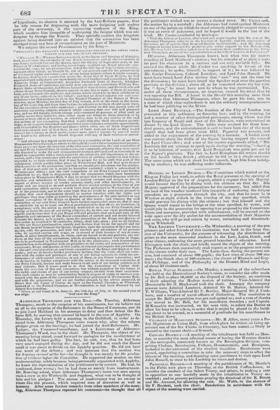ALDERMAN THOMPSON AND THE BILL .—On Tuesday, Alderman Thompson, much to
the surprise of his constituents, but we believe not at all to the surprise of the Reformers in the House of Commons, saw fit to join Lord Maitland in his attempt to delay and thus defeat the Re- form Bill, by moving that counsel be heard in the case of Appleby. On Thursday, the Livery held a meeting in the Guildhall, in order to de- mand from Alderman Thompson some reason why, after the solemn pledges given on the hustings, he had joined the Anti-Reformers. Mr. Ledger, the Common-Councilman, and a Liveryman of Alderman Thompson's Ward, was in the chair. Mr. Thompson, the object of the meeting being stated, stood forward to apologize for time inadvertence of -which he had been guilty. The fact, lie said, was, that he had been very much engaged during the day, and he did not reach the House until it was about to divide on the Appleby question. He did not hear one word of the debate ; and was ignorant that the motion was for hearing comae! at the bar—he thought it was merely for the produc- tion of evidence before the Committee. lie supported the motion on this understanding., solely because, being personally acquainted with Appleby, he knew the representation of the petitioners to be correct. He had, he confessed, done wrong ; but he had done so merely from inadvertence. Dr. Bowring asked, when Alderman Thompson's name was seen among such a crew as the Wetherells and Sugdens, what was to be thought of him and his pledges ? The excuse of inadvertency was no excuse in times like the present, which required men of discretion as well as honesty. After some further remarks from other members of the meet- ittg, Alderman Thompson repeated his statement—he thought that all
the petitioners wished was to correct a clerical error. Mr. Cokes said, the matter lay in a nutshell : the Alderman had voted against Ministers on one of the points on which he stood solemnly pledged to support them : it was an error of judgment, and he hoped it would be the last of the kind. Mr. Coates concluded by moving-
" That the Livery of London, after a full and ample inquiry into the vete of Mr. Alderman Thompson relative to the borough of Appleby. and his explanation of the same, are of opinion that he acted therein inadvertently ; and Mr. alderman Thompson having renewed his pledge to give entire support to the Reform this Meeting feel themselves called upon to continue their confidence to air. Alder- Man Thompson, as one of the representatives of the City of London in Parliament ."
Of course, Alderman Thompson knows best what was his under- standing of Lord Maitland's motion ; but his mistake of so plain a mat- ter puts his character in a curious and nut very enviable light. He entered the House while Mr. Croker was speaking in favour of the amendment ; he spoke, himself, in support of it ; he was followed by Mr. Cutler Fergusson, Colonel Lowther, and Lord John Russell. Ile must have heard Lord John declare that " now" was not the time for the discussion ; be must have heard the Speaker read over the question previous to the division ; above all, as he remained above the bar with the " Ayes," he must have seers by whom he was .surrounded. Yet, under all these circumstances, no suspicion crossed his mind that he was opposing the Bill. A letter in the Herald this morning more than insinuates that Alderman Thompson, when he gave his vote, was in a state of which clear-sightedness is not the ordinary accompaniment— he had been jollifying on the River.
LORD JOHN RUSSELL.—The freedom of the City of London was presented to this nobleman on Saturday last ; and in the evening, he and a number of other distinguished personages, among whom was the late Emperor of Brazil and most of the Ministers, were entertained at dinner by the Lord Mayor. The tables were covered for three hun- dred guests, and the entertainment is said to have been one of the most superb that had been given since 1815. Paganini was present, and added to the enjoyments of the evening by a fantasia. A foolish story was current about the fiddle of the Signor having stopped the voice of the Lord Chancellor ; and some of the reports sagaciously added, " His Lordship did nbt attempt to speak again during the evening,"—leaving it to be inferred, of course, that Lord Brougham was quite put out by the Signor's pizzicato. The fact is, Lord Brougham did return thanks on his health being drunk ; althOugh he did so in a single sentence. The same cause which cut short his first speech, kept him from indulg. ing in another ; he was suffering under influenza.


























 Previous page
Previous page